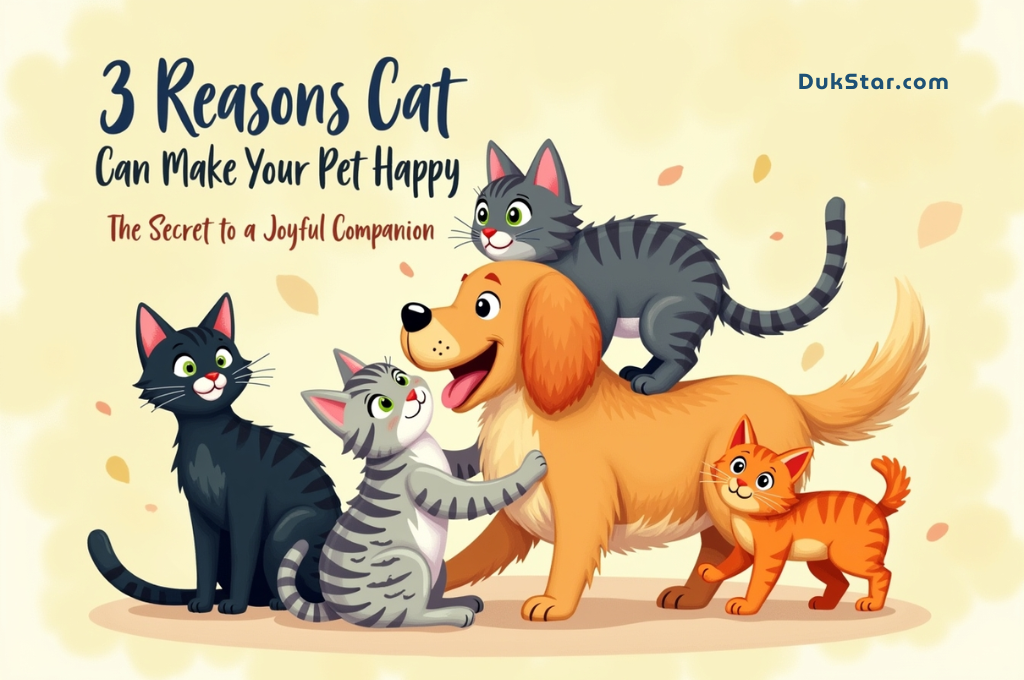3 Reasons a Cat Can Make Your Pet Happy- The Secret to a Joyful Companion!

Introduction-
Cats are captivating animals, balancing independence with a loving and affectionate personality. Many pet owners wonder if introducing a cat into their home can bring happiness to their existing pets. The truth is that cats can significantly contribute to the well-being of other animals in the household. In this article, we’ll dive into 3 reasons a cat can make your pet happy and how their presence enhances the overall environment for other pets.
Companionship and Social Interaction
One of the primary 3 reasons a cat can make your pet happy is their ability to provide companionship. Pets, like humans, can experience loneliness, which may lead to anxiety and behavioural issues. Having a cat around can offer a sense of security and social interaction, especially for animals that thrive in the company of others.
Reducing Loneliness
Many animals, such as dogs and rabbits, form deep social bonds. When left alone for long hours, they may feel isolated. A cat can be a constant companion, reducing loneliness and promoting a healthier mental state.
Encouraging Playfulness
Cats are naturally playful and energetic. Their playful nature can encourage other pets to engage in activities, keeping them entertained and active. This interaction not only strengthens their bond but also improves their overall well-being.
Building a Strong Bond
Over time, pets and cats learn to communicate with each other. They develop a shared language through body gestures, sounds, and playful interactions. This bond can provide comfort, security, and a sense of belonging for the cat and the other pet.
Entertainment and Mental Stimulation
Another critical aspect of the 3 reasons a cat can make your pet happy is the entertainment and mental stimulation they offer. Pets need mental enrichment to stay engaged and avoid boredom. With their unpredictable antics and playful behaviour, cats can provide endless entertainment for other pets.
Interactive Play Sessions
Pets enjoy watching and playing with cats. A cat’s spontaneous jumps, pounces, and chases keep other pets engaged. Dogs, for instance, often find joy in observing a cat’s playful activities, stimulating their curiosity and interest.
Reducing Boredom
Pets, particularly those that stay indoors, require mental stimulation to stay happy. A cat’s unpredictable movements and explorative nature provide constant engagement, preventing boredom and associated behavioural problems.
Encouraging Physical Activity
Physical activity is essential for a pet’s health. When pets interact with cats, they tend to become more active. Whether a dog chasing a cat or another pet curiously following the feline around, this movement contributes to better physical fitness and overall happiness.
Comfort and Emotional Support
The final point among the 3 reasons a cat can make your pet happy is the emotional support cats provide. Cats have a calming presence that can positively affect other pets in the household.
Soothing Effects of Purring
Cats possess a special ability to purr, which has a calming effect on both humans and animals. Scientific studies suggest that cat purring can reduce stress and promote healing. Other pets, especially anxious ones, can find comfort in this soothing sound.
Emotional Stability
Cats can bring a sense of stability to Pets dealing with anxiety or separation concerns. Their gentle demeanour and relaxed nature can set a peaceful atmosphere in the home, helping other pets feel safe and at ease.
Building Trust and Affection
With time, pets and cats develop trust. A genuine friendship may blossom once a pet understands the cat poses no threat. This companionship can enhance emotional well-being and create a harmonious household.
How to Introduce a Cat to Your Pet
While the 3 reasons a cat can make your pet happy are clear, proper introduction is key to ensuring a successful relationship. Here are some steps to introduce a cat to your existing pet.
Slow Introduction: Allow both pets to familiarize themselves with each other’s scent before direct interaction.
Supervised Meetings: Ensure initial interactions are supervised to prevent aggression or fear-based reactions.
Separate Spaces: Give each pet their own space initially to avoid territorial disputes.
Positive Reinforcement: Reward pets with treats and affection when they exhibit friendly behaviour.
Patience is Key: Allow the pets to adjust to each other naturally without forcing interactions.
Conclusion
In summary, the 3 reasons a cat can make your pet happy revolve around companionship, entertainment, and emotional support. Cats contribute to a pet’s happiness by offering a sense of belonging, stimulating their minds, and providing comfort. Pet owners can foster a harmonious home where all animals thrive together by introducing a cat properly and ensuring a positive environment.
FAQs
Q1. Can all pets get along with cats?
While most pets can develop a good relationship with cats, proper introduction and patience are key to a successful bond.
Q2. How long does it take for a cat and another pet to bond?
It depends on the pet’s personality. Some may form bonds in a matter of days, while others could take weeks or even months.
Q3. What if my pet is aggressive toward the cat?
Introduce them slowly and use positive reinforcement to encourage calm behaviour. If aggression persists, consult a pet behaviour specialist.
Q4. Do cats prefer being alone or with other pets?
Cats are independent but can enjoy the company of other pets if introduced properly. Some cats may prefer solitude, while others thrive in companionship.
Q5. Can a cat help reduce my pet’s anxiety?
Yes! A cat’s presence, especially its soothing purring, Can help alleviate stress and offer emotional support for anxious pets.

